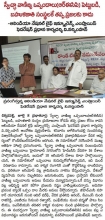Trade Unions Question the Asian Mega Free Trade deal RCEP

The 19th round of the RCEP negotiations will take place in Hyderabad from 18-28 July.
Setting the context, economist D Narasimhan Reddy stressed that despite that the negotiations have been underway since more than two years and a half, no text has been shared with elected representatives, State governments or trade union representatives. “This is a blow to Indian democratic system and until the content of the negotiations is debated publicly these negotiations should not carry forward”, he said.
“RCEP sets a framework where national policies can be influenced and modified by foreign actors in the name of transparency in policy making”, said Adil Shariff, from the Indian National Municipal & Local Bodies Workers Federation. “Sound and solid industrial policy is required to take India out of the job crises it is facing, this can not be compromised further by giving foreign players a say in our domestic policies”, Rao concluded. Available data bears out Shariff’s assertion as it is estimated that while 12 million and 15 million jobs are needed every year to provide for the new workforce coming on to the labour market, less than 10% of this number is created each year. This is not a new trend as even during the 6 years of high growth between 2004-10 only 27 million jobs created - a shortfall of 45 million jobs. Further, most are informal, contractual and in the unorganised sector.
Speaking on behalf of essential services unions’ federation Public Services International (PSI) and All India National Life Insurance Employees Federation, V Narasimhan stressed that “the Investor State Dispute Settlement (ISDS) arbitration mechanism proposed under RCEP is biased to favour corporates. It is an irrational system that compensates companies for profits they have not yet made. The resources lost through these corporate challenges are tax payers’ contributions that should be used to strengthen publicly provided healthcare, education and social security, not for corporate greed.”
Further, government revenues will be impacted by the loss of import duties. “RCEP’s provisions to drastically reduce import tariffs for all RCEP countries, including China with whom India currently has its largest trade deficit, will only worsen the job crisis and loss of government revenues”, explained Susana Barria from PSI in South Asia.
RCEP has the potential to devastate the livelihoods of peasants and workers, further marginalise and exploit vulnerable communities, increase the cost of medicines, including life saving ones, further expensive and dubious quality private healthcare and education, and entrench monopolies in the digital economy, among many issues. “This is why there is a large coalition of people’s organisations that has come together in India and across the 16 countries part of the RCEP negotiations to demand a halt to these talks”, explained Kirankumar Vissa, from Rythu Swarajya Vedikaand representing the People’s Resistance Forum against Free Trade and RCEP.
Representatives from major national centers, such as AITUC, CITU, INTUC and BMS among others, expressed their support with the Peoples Resistance Forum that is proposing a People’s Summit against FTAs and RCEP from 22-26 July in Telengana’s capital. PSI is a part of the People’s Resistance Forum against Free Trade and RCEP and will be actively involved in the People’s Summit.
DOWNLOAD THE FULL CALL TO ACTION IN THE ATTACHMENT BELOW

